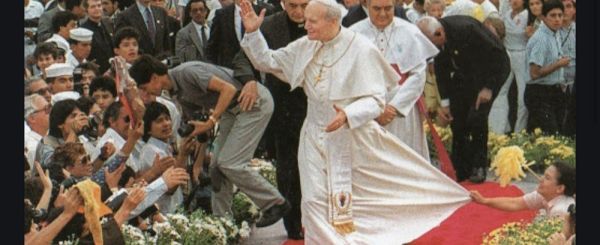Fighting personal sin and "sin structures”
1. As we continue our reflection on conversion, sustained by the certainty of the Father's love, today we will focus our attention on the meaning of sin, both personal and social.
Let us first look at Jesus' attitude, since he came to deliver mankind from sin and from Satan's influence.
The New Testament strongly emphasizes Jesus' authority over demons, which he cast out "by the finger of God" (Lk 11: 20). In the Gospel perspective, the deliverance of those possessed by demons (cf. Mk 5: 1-20) acquires a broader meaning than mere physical healing in that the physical ailment is seen in relation to an interior one. The disease from which Jesus sets people free is primarily that of sin. Jesus himself explains this when he heals the paralytic: ""That you may know that the Son of man has authority on earth to forgive sins' he said to the paralytic "I say to you, rise, take up your pallet and go home'" (Mk 2: 10-11). Even before working cures, Jesus had already conquered sin by overcoming the "temptations" which the devil presented to him during the time he spent in the wilderness after being baptized by John (cf. Mk 1: 12-13); Mt 4: 1-11; Lk 4: 1-13).
To fight the sin that lurks in us and around us, we must follow in Jesus' footsteps and learn the sense of his constant "yes" to the Father's plan of love. This "yes" demands our total commitment, but we would not be able to say it without the help of that grace which Jesus himself obtained for us by his work of redemption.
2. Now, looking at the world today we have to admit that there is a marked decline in the consciousness of sin. Because of widespread religious indifference or the rejection of all that right reason and Revelation tell us about God, many men and women lack a sense of God's Covenant and of his commandments. All too often the human sense of responsibility is blurred by a claim to absolute freedom, which it considers threatened and compromised by God, the supreme legislator.
The current tragic situation, which seems to have foresaken certain fundamental moral values, is largely due to the loss of the sense of sin. This fact makes us aware of the great distance to be covered by the new evangelization. Consciences must recover the sense of God, of his mercy, of the gratuitousness of his gifts to be able to recognize the gravity of sin which sets man against his Creator. Personal freedom should be recognized and defended as a precious gift of God, resisting the tendency to lose it in the structures of social conditioning or to remove it from its inalienable reference to the Creator.
3. It is also true that personal sin always has a social impact. While he offends God and harms himself, the sinner also becomes responsible for the bad example and negative influences linked to his behaviour. Even when the sin is interior, it still causes a worsening of the human condition and diminishes that contribution which every person is called to make to the spiritual progress of the human community.
In addition to all this, the sins of individuals strengthen those forms of social sin which are actually the fruit of an accumulation of many personal sins. Obviously the real responsibility lies with individuals, given that the social structure as such is not the subject of moral acts. As the Post-Synodal Apostolic Exhortation Reconciliatio et Paenitentia recalls: "Whenever the Church speaks of situations of sin, or when she condemns as social sins certain situations or the collective behaviour of certain social groups, big or small, or even of whole nations and blocs of nations, she knows and she proclaims that such cases of social sin are the result of the accumulation and concentration of many personal sins.... The real responsibility, then, lies with individuals" (n. 16).
It is nevertheless an indisputable fact, as I have often pointed out, that the interdependence of social, economic and political systems creates multiple structures of sin in today's world. (cf. Sollicitudo rei socialis, n. 36; Catechism of the Catholic Church, n. 1869). Evil exerts a frightening power of attraction which causes many types of behaviour to be judged "normal" and "inevitable". Evil then grows, having devastating effects on consciences, which become confused and even incapable of discernment. If one then thinks of the structures of sin that hinder the development of the peoples most disadvantaged from the economic and political standpoint (cf. Sollicitudo rei socialis, n. 37), one might almost surrender in the face of a moral evil which seems inevitable. So many people feel powerless and bewildered before an overwhelming situation from which there seems no escape. But the proclamation of Christ's victory over evil gives us the certainty that even the strongest structures of evil can be overcome and replaced by "structures of good" (cf. ibid., n. 39).
4. The "new evangelization" faces this challenge. It must work to ensure that people recover the awareness that in Christ evil can be conquered with good. People must be taught a sense of personal responsibility, closely connected with moral obligations and the consciousness of sin. The path of conversion entails the exclusion of all connivance with those structures of sin which, today in particular, influence people in life's various contexts.
The Jubilee offers individuals and communities a providential opportunity to walk in this direction by promoting an authentic "metanoia", that is, a change of mentality that will help create ever more just and human structures for the benefit of the common good.
[Pope John Paul II, General Audience 25 August 1999]












